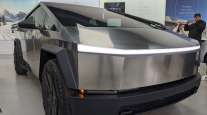Managing Editor, Features and Multimedia
Tesla Delivers Its First Electric Semis to PepsiCo

[Stay on top of transportation news: Get TTNews in your inbox.]
Tesla Inc. has handed over the first of its long-awaited battery-electric Class 8 tractors to private fleet operator PepsiCo, kicking off customer deliveries for the vehicle originally unveiled more than five years ago.
The electric vehicle maker and its CEO, Elon Musk, celebrated those initial Tesla Semi production units and offered more information about the vehicle’s design and capabilities during a Dec. 1 event at the company’s Gigafactory near Reno, Nev. The event was streamed live on Twitter, which Musk recently purchased.
Flanked by blue and orange Tesla Semis marked with the Pepsi and Frito-Lay logos, Musk touted the electric-powered truck’s potential to reduce emissions in the trucking industry while at the same time improving cargo efficiency, enhancing safety and appealing to truck drivers.
Musk, who arrived at the event driving a Tesla Semi and then stepped onto a flatbed trailer that served as a stage, described Tesla’s entry into the heavy-duty truck market as a “crucial piece of the puzzle” in the company’s overall mission to accelerate the shift toward sustainable energy.
https://t.co/mq8y8Rtuej — Tesla (@Tesla) December 2, 2022
PepsiCo previously confirmed plans to deploy its first Tesla Semis at its Frito-Lay plant in Modesto, Calif., and its beverages plant in Sacramento.
The snack food and beverage company, based in Purchase, N.Y., ranks No. 1 on the Transport Topics Top 100 list of the largest private motor carriers in North America.
During the event, Musk acknowledged the long wait for the Tesla Semi, which was introduced in late 2017 and originally slated for production in 2019.

Musk
“I can’t believe it’s been five years,” he said. “There’s been a lot that’s happened since then, to say the least.”
In the meantime, major truck manufacturers such as Daimler Truck, Volvo Trucks, Paccar and Navistar all have rolled out battery-electric models of their own and have been working closely with their fleet customers and dealer networks to support the shift toward electrification.
The Tesla Semi, however, remains unique in terms of its distinctive vehicle design and extended range compared with a typical battery-electric truck.
Tesla said its daycab tractor can travel 500 miles on a single charge while pulling a fully loaded trailer. To demonstrate that range, the company played video from a recent Tesla Semi run from Fremont, Calif., to San Diego — completed without recharging while hauling just under 82,000 pounds.
The best driver experience: max road visibility, space to stand up, 2x 15-inch touch screens, wireless phone charging & more pic.twitter.com/ktrh602Krd — Tesla (@Tesla) December 2, 2022
Beyond its focus on freight efficiency, Tesla also set out to produce a truck that drivers will be eager to drive.
The Tesla Semi features a sloped, aerodynamic chassis resembling a bullet train and its driver’s seat is positioned the center of the cab to maximize visibility.
“It looks sick,” Musk said, gesturing at the vehicle. “There’s actually a big shortage of drivers. If you’re a truck driver and you want the most badass rig on the road, this is it.”
The Class 8 tractor incorporates components already used on Tesla’s passenger cars, including drive units, power electronics, inverters and the infotainment system.
“We’re able to leverage the existing powertrain and elements that are already made at volume in order to achieve extreme efficiency of cost and capability,” Musk said.
The tractor is powered by a tri-motor electric powertrain system. One highway drive unit is constantly engaged while cruising and does the bulk of the work. The two other drive units provide torque and acceleration only when needed to pull away from a loading dock, climb a hill or pass another vehicle, for example.
The electric drivetrain not only improves the truck’s ability to tackle steep inclines, but also increases efficiency and safety while descending a steep grade, the company said.
Tesla Semi driving 500 miles, fully loaded, on a single charge pic.twitter.com/iZzomLcwZF — Tesla (@Tesla) December 2, 2022
Rather than using a Jake Brake or engine braking like a diesel truck, the Tesla Semi’s regenerative braking recaptures energy while going downhill.
“When we get to the bottom of the hill, we have cold brakes,” Musk said. “That’s mind blowing in the trucking world.”
The company also highlighted its rigorous testing of the Tesla Semi’s durability, both in the lab and in the real world across a range of weather conditions.
“Uptime is super important for any kind of semi truck,” Musk said.
In addition, Tesla announced it will be using its electric tractor in its own supply chain to transport freight between its factories and suppliers.
Among the attendees was Mike Roeth, executive director for the North American Council for Freight Efficiency. Roeth said he was impressed with what he saw at the event but also left with a lot of questions, especially regarding the vehicle’s weight, which Tesla has not revealed.
A standout moment was the recap of the Tesla Semi’s 500-mile trip while fully loaded on a route that included California’s Grapevine mountain pass.
“That’s an impressive run,” Roeth said. “That’s got the industry abuzz, I think, as it well should.”
Roeth also said he was surprised at how simple and small the vehicle’s components appeared to be during a tour of the manufacturing line.
He described the Tesla Semi as a “very purpose-built truck,” with the cab, frame and components designed specifically for highway driving without making compromises to support tougher duty cycles such as a dump truck or logging vehicle.
Want more news? Listen to today's daily briefing below or go here for more info:




